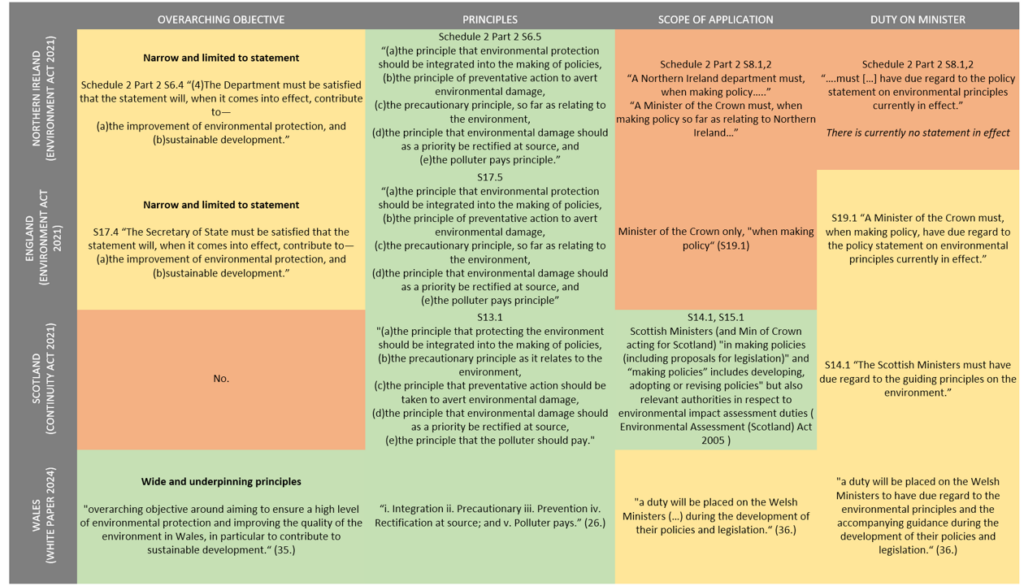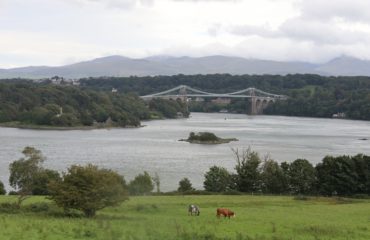Third time the charm? Comparing the Welsh approach to environmental principles with the rest of the UK

Whether we will see divergence or convergence in areas of devolved competence after Brexit has been a recurring question since the 2016 referendum. A simple answer is – both… and it depends on where/what we are looking at. Take environmental governance: one body for England and Northern Ireland (convergence) but a different body for Scotland (divergence). As for principles, England, Northern Ireland and Scotland have the same list of principles but each have their different guidance.
What of Wales in this context? As we have explained in our two previous blog posts, Wales is a late mover when it comes to environmental governance, and is building on preparatory work from the Environment Governance Stakeholder Task Group. It is only properly patching gaps for enforcement and environmental principles now – and it could take a further year, or two, before a new regime is in place. As it is moving last, Welsh decision-makers have been able to take stock of how the rest of the UK has dealt with environmental principles. This blog asks, is Wales doing anything different? And if so, will principles be better protected in Wales than elsewhere in the UK?
How does Wales compare to the rest of the UK?
As Table 1 below shows, major differences in how principles are integrated in law remain, both comparing the new post-Brexit regimes within the UK and with the EU status quo. One apparent similarity though is that ministers are to ‘have due regard’ to principles. ‘Have due regard’ has been the bane of some environmental legal experts (although welcome by others) throughout the long passage of the Environment Act 2021 in Westminster. The wording is also found in the Scottish Continuity Act 2021. But if we look closer the provisions are different. Ministers in NI and England are to have due regard to their respective statements on environmental principles, meanwhile Scottish ministers are to have due regard to the principles themselves. In an interesting move (or in a refusal to choose?), the Welsh proposal is for ministers to have due regard to both the principles and the guidance that explains them.
Another major difference is in terms of overarching objectives. No such objectives are mentioned in the Scottish Continuity Act. They are vaguely and weakly addressed in the Environment Act 2021 whereby Ministers need to be satisfied that the policy statement would contribute to the improvement of environmental protection, and sustainable development. Here Wales is much clearer and ambitious proposing an “overarching objective around aiming to ensure a high level of environmental protection and improving the quality of the environment in Wales, in particular to contribute to sustainable development”. Yet it is important to note this objective is much narrower than the EU’s (no mention of health, climate change, or promotion of environmental action externally).
As for when and to whom principles apply, Wales is most in line with England and Northern Ireland, with principles applying to ministers, at policy/legislation development stage. This, as set out in the English statement on principles, can be extensive. But it falls short from the EU’s situation, where the principles are also used by the Court to interpret EU law. Only Scotland mentions the Court – enjoining ministers to consider the Court interpretation of the principles in their own understanding of them – and expands (in a very specific context) the principles to other public authorities when engaged in environmental impact assessments.

Building on Wales principled approach to environmental governance
The White Paper is a good starting point but this is a unique opportunity to shape the role of environmental principles in Welsh governance. A more ambitious approach, less bound by the limitations self-imposed by governments in Scotland or Westminster can be chosen. Wales can, and should, further build its different approach to principles:
Key recommendations:
- The overarching objectives should also include the integration principle so that it can play a horizontal role across sectors and policies and create a more holistic approach.
- The duty on ‘Welsh Ministers to have due regard to the environmental principles and accompanying guidance during the development of their policies and legislation’ should be stronger to include ‘must be in accordance with the environmental principles and guidance’.
- Such duty should be expanded to be placed upon all Welsh public authorities, bodies undertaking actions on behalf of Wales (including the Welsh Government, regulatory bodies ) as well as private companies when discharging functions relating to the environment thereby ensuring that the objective and principles underpin all Welsh policy and law at all stages.
- The application of the environmental principles should be extended to include the implementation and interpretation of environmental law, including by the Courts. This way the objective and principles would underpin all Welsh policy and law at all stages.
- One act should be created that consolidates, brings together the White Paper, the Well-being of Future Generations (Wales) Act 2015 and the Environment (Wales) Act to holistically address environmental governance gaps and the future of Welsh environmental law and policy (and avoid the proposed siloed approach with existing legislation and principles).
- The three pillars of the Aarhus Convention (Access to Information, Public Participation in Decision-making and Access to Justice) are completely left out of the scope of the White Paper and must be included back in the text.




